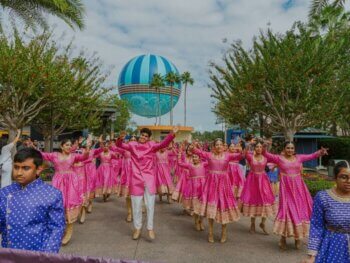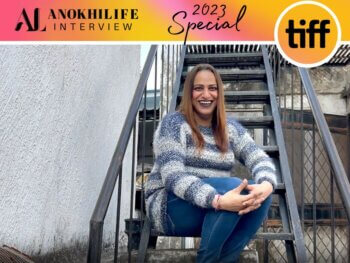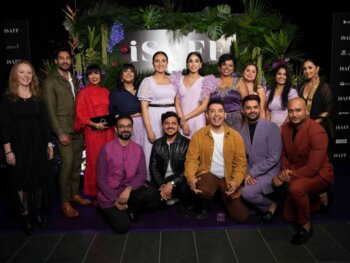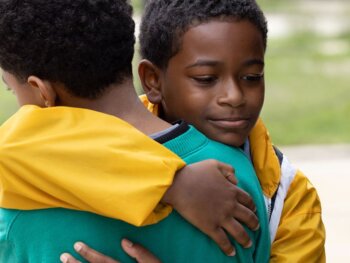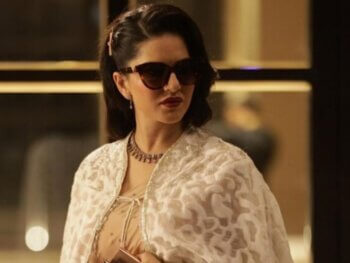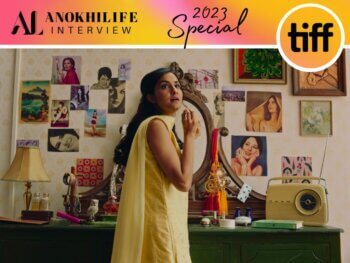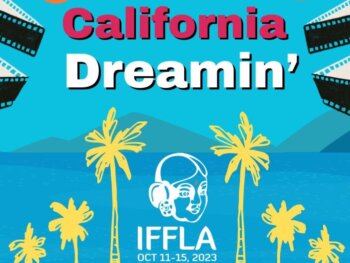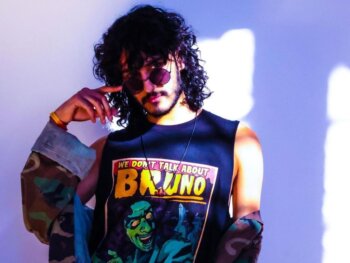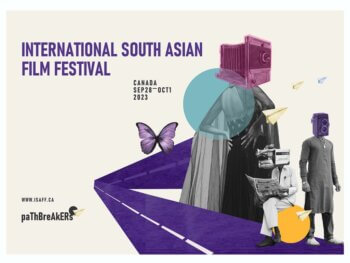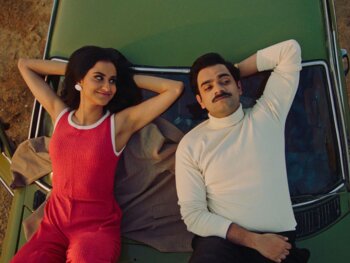Canadian actor, writer and comedian Rakhee Morzaria discusses the Pham family’s new normal in season two, using comedy to tackle racism and her go-to procrastination techniques to avoid writing.
In spring 2021, the world said a bittersweet farewell to Kim’s Convenience, the little Canadian sitcom that had rocketed to surprise international success. But less than a year later, we were introduced to a new comedy, co-created by and starring one of KC’s fan-faves, Andrew Phung.
Filmed in Hamilton, Ontario, Run The Burbs centred on the Pham family — stay-at-home dad Andrew (played by Phung himself), career woman Camille (Rakhee Morzaria, also a writer on the show) and their two precocious kids, Khia (Zoriah Wong) and Leo (Roman Pesino). Let the charmingly absurd suburban adventures begin!
Season two opened early this past January, and found the Vietnamese-Indian fam dealing with a new status quo, as Camille had quit her job to pursue an entrepreneurial passion project, while Andrew set out to join the workforce.
Recently, Anokhi Life chatted with actress Morzaria about that new normal, as well as why she took a step back from the writers’ room this year, and the surprising, empowering moment that kicked off season two.
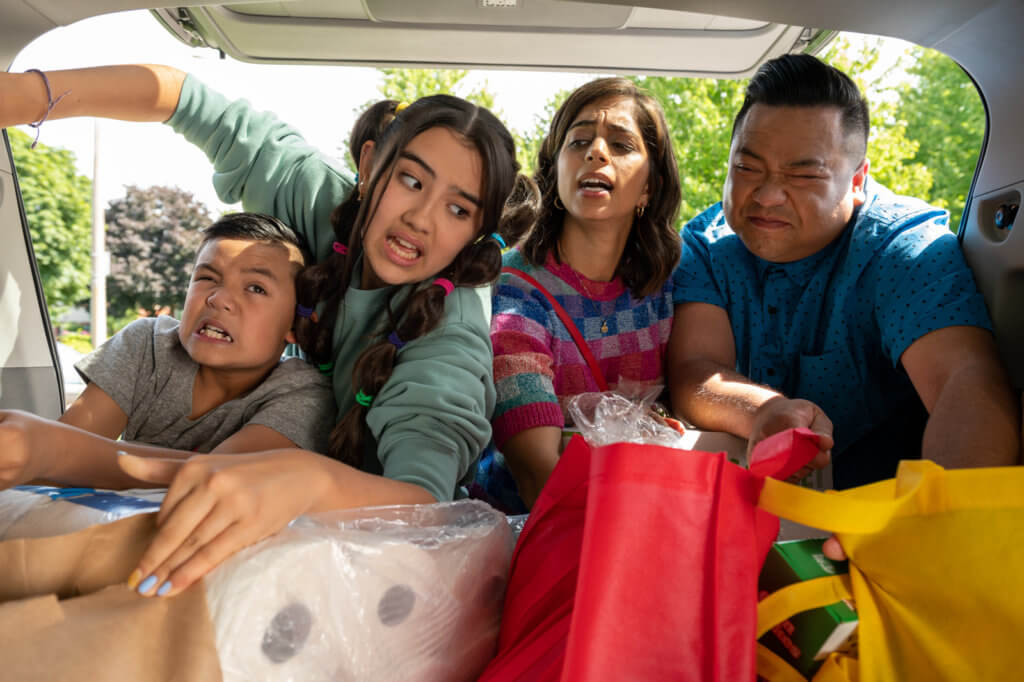
Matthew Currie: Can you talk about that cold open of the season two premiere?
Rakhee Morzaria: It was really incredible when I read it. I was like, “Oh my God, this is such a fun part for me to get to do.” And I was also kind of shocked by it because, “Oh my God, he says that to her?” But I love how Camille gets to go off on him, and how the whole neighbourhood supports her in it. It was a really powerful moment, and very simple as well. It really shows you a lot about her character, and we had a lot of fun shooting it.
And thanks to the actor who took it. I just yelled at him [laughs]. I wanted to say, “Thank you for being such a good scene partner,” because I really went off on him.
MC: Interestingly, the brevity of that scene kind of robs the racist mindset of its power, as opposed to devoting an entire episode to it . . .
RM: It’s a choice sometimes. Racist things happen all the time. And they can either shake you and you can internalize it and you deal with that. That can be one day. And the next day, something happens to you and you decide to just say, “Nah, I’m not letting this affect my day. Moving on!” And I think that’s the one thing about this family: things do impact them and they do get discussed and they do get opened, but in this moment, we wanted to show an instance of something pretty heavy happening, and her saying, “Nah, I’m not going to let this affect my beautiful day and the family and my neighbourhood. Get outta here!”
MC: The Phams are really in the midst of a new status quo this year, with Camille leaving her job last year . . .
RM: End of season one, Camille was at work and Andrew was very much at home with the kids. At the start of season two, she is at home, trying to work as an entrepreneur, getting her cooking [business] off the ground, but she’s also a lot more present for all of the kids and for all of their moments of growth. Which I think is really interesting, because you kind of get to see how Andrew and Camille differ as parents, and how they work through communicating with their kids. You also get to see her struggle a little bit with trying to make it as a freelancer, so to speak — to build something from the ground up.
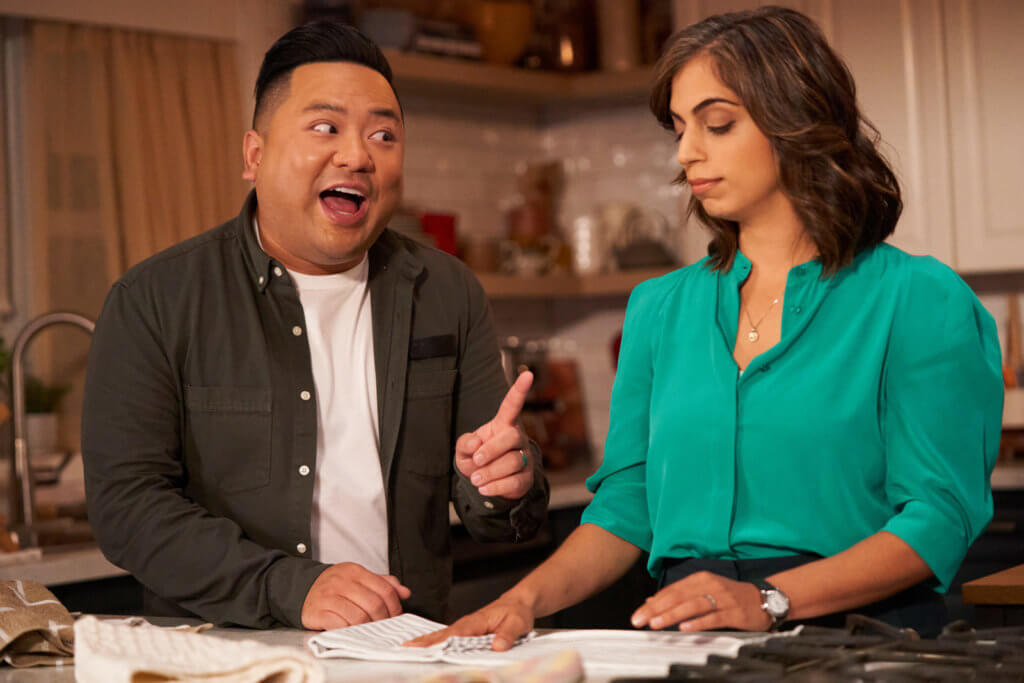
MC: The kids are also entering a tumultuous new phase of adolescence.
RM: Totally. They’re moving into some sort of adulthood in the show. And that’s just really new for both Camille and Andrew. Camille was, like, 20, when she had Khia. I think for a long time, Khia and Camille sort of had this super-friendship that is unique to their family because of how young the family was when they had the children. Now, you see the kids pulling away, and I think that really affects the parents — or at least Camille.
MC: Back when season one was in development, you were a writer first, then unexpectedly landed the role of Camille. How has it been, balancing writing and acting?
RM: I stepped back from the writers’ room in the second season . . . It’s probably better mentally for me not to be involved in the writers’ room. As a writer, you have a more holistic view of things. You’re thinking about everybody’s story and how the stories intertwine. And as an actor, you’re looking at an arc of a character, you’re making everything specific to you, and you’re doing a lot of research to build those backstories. It’s a lot more fine-tuned and specific. It’s a lot more emotional work.
MC: Conan O’Brien, on his podcast, has talked about the actor brain vs. the writer brain.
RM: Yeah, because sometimes you need to shut up the writing brain. When you’re on-set and you’re acting and you have a writer thought . . . I think it’s a skill to be able to do both at once. Once you get onto set, you have to just be there and be present. If you are distracted, you look distracted. The camera picks up everything. This year, both Andrew and I tried to support ourselves so that when we’re on-set, we’re only working as actors. It really did make it so that you could have a lot more fun.
MC: When you do write, on this show or other projects, what’s your go-to procrastination technique to avoid actually writing?
RM: Oh my God! I’ll make food. [Or] maybe I’m writing about a superhero movie, an action film, so I’ll be like, “Well, I have to do research.” And then I’ll just get way too into the research, which will trick myself into thinking that I’m actually doing research, but really I’m just watching Powerpuff Girls trailers or something [laughs]. Not actually doing the research, but lying to myself. Procrastinating is just part of it. I’m trying to accept that it’s just part of it. But don’t you feel so garbage when you’re procrastinating? Because I know what I’m doing — I’m avoiding.
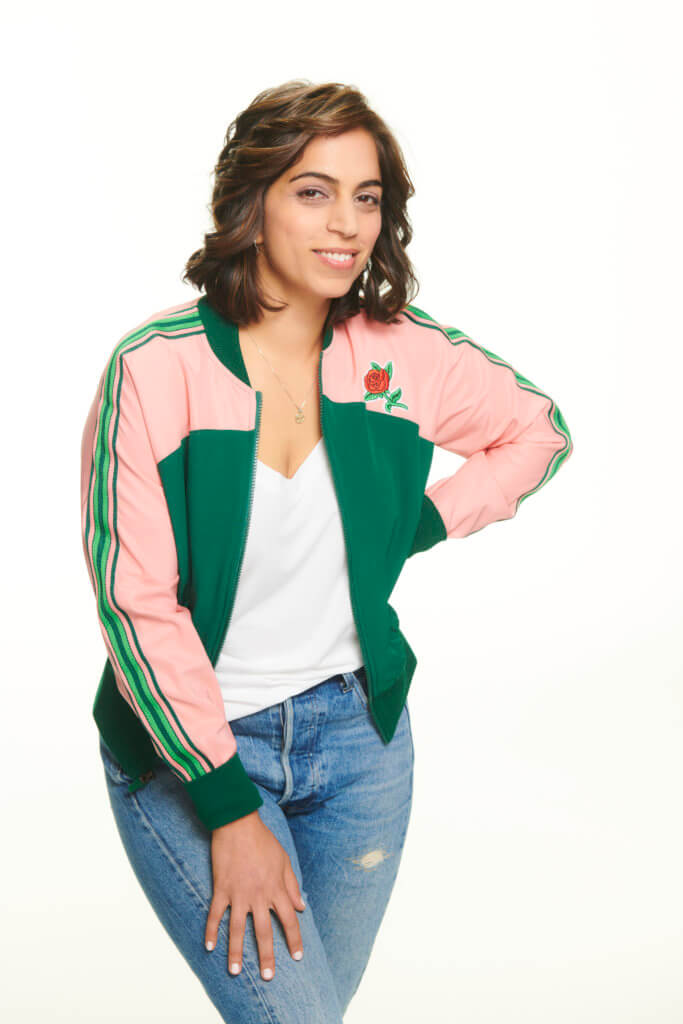
MC: This show has been held up as a champion of representation on mainstream TV. Is there any extra pressure for you that goes along with that?
MC: I think that comes from a place of what [other] people say about the show, or what they pick up about it. And that’s great. For us, it’s always been a family comedy. It’s got this lightness, it’s got a whimsical nature to it. I love it because I get to be funny. I get to be a funny, strong woman onscreen. And that’s all I’ve ever wanted to do — to be doing comedy.
So yeah, sometimes people say that [about the show’s representational value], and I’m like, “Oh, I’m so glad that’s what resonates for you.” For someone else, it might be another character or a storyline or a relationship. Often, I do feel kind of pressured to represent something, but I always remind myself: this is representative of the character. Everything cultural is the character, and not necessarily mine. Because being South Asian, there are so many different stories. Even my personal story of my parents’ journey to Canada is vastly different than Camille’s. But likewise, there are some cultural similarities. It’s kind of a funny thing where you can’t ever get it right — but you can get it right and make choices for that character.
Main Image Photo Credit: Rakhee Morzaria
Matthew Currie
Author
A long-standing entertainment journalist, Currie is a graduate of the Professional Writing program at Toronto’s York University. He has spent the past number of years working as a freelancer for ANOKHI and for diverse publications such as Sharp, TV Week, CAA’s Westworld and BC Business. Currie ...




































































































